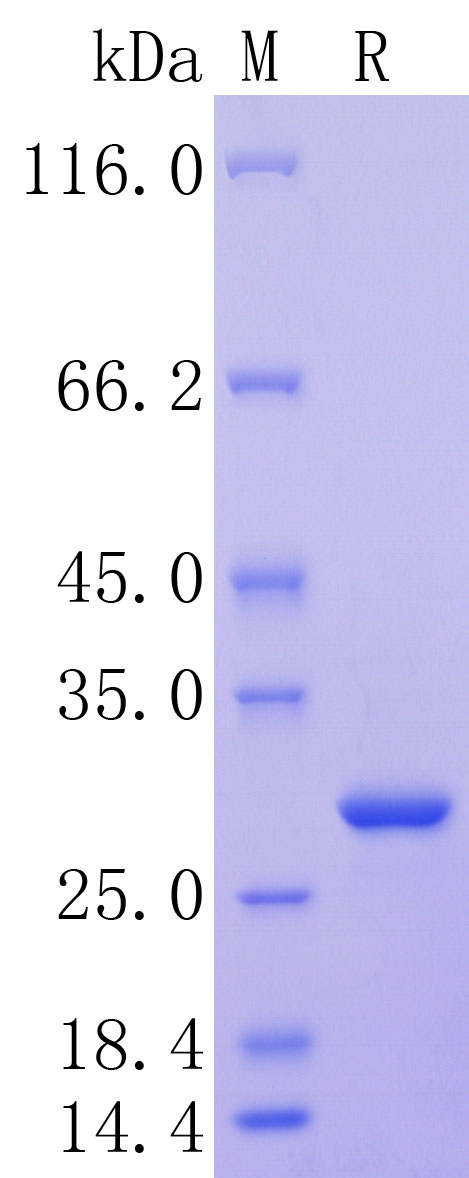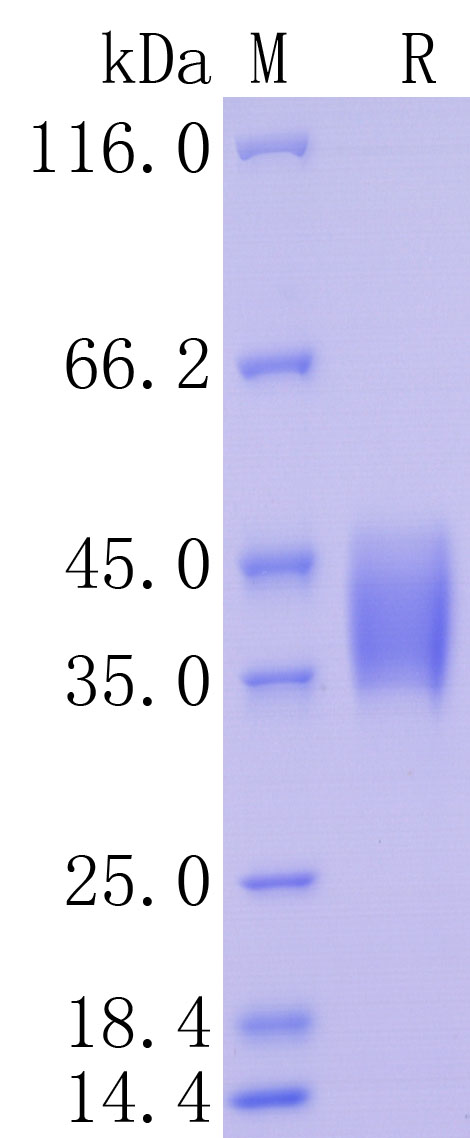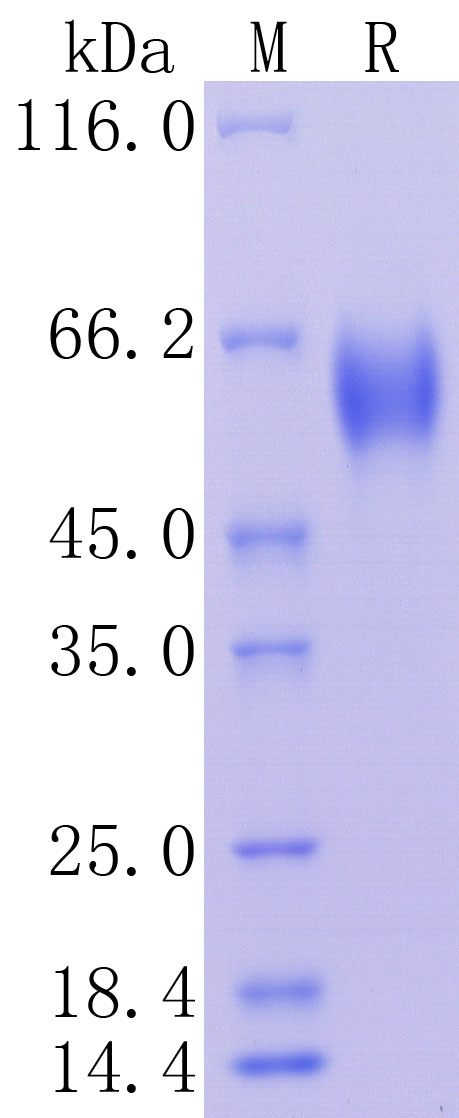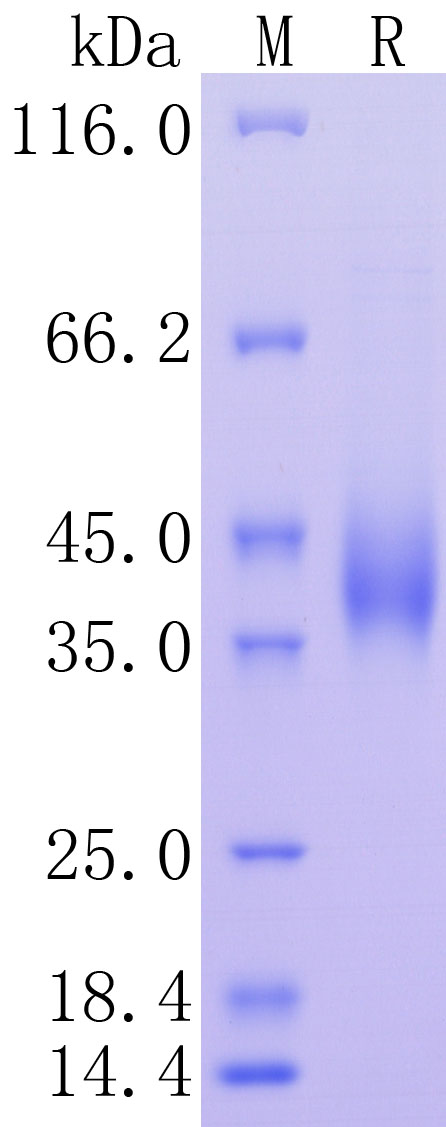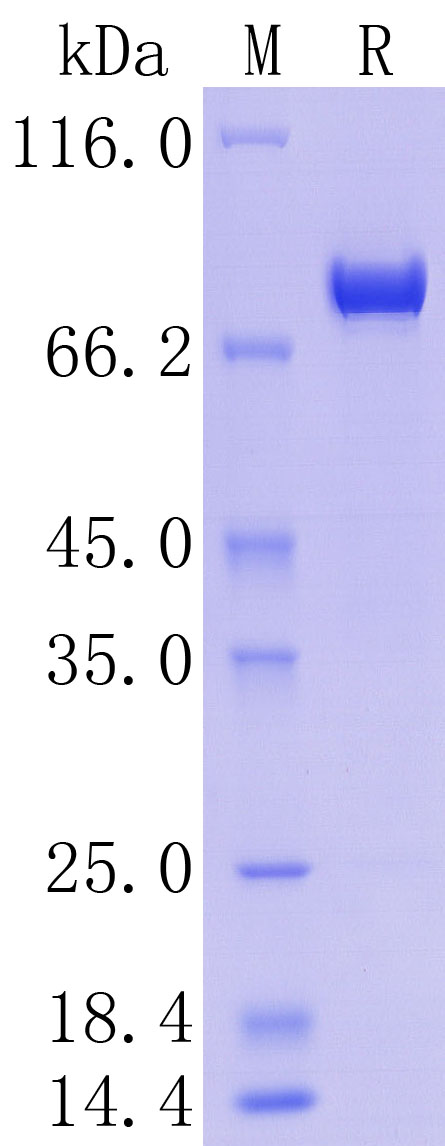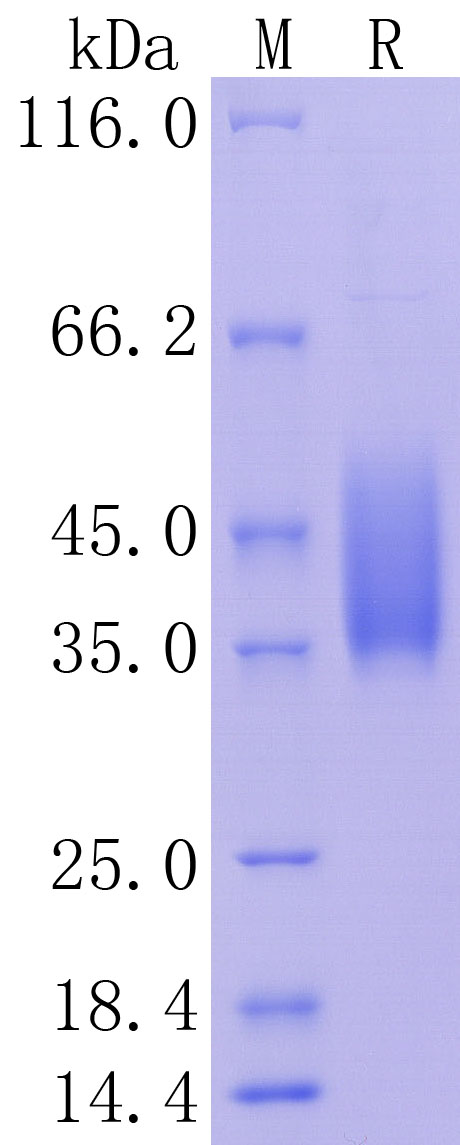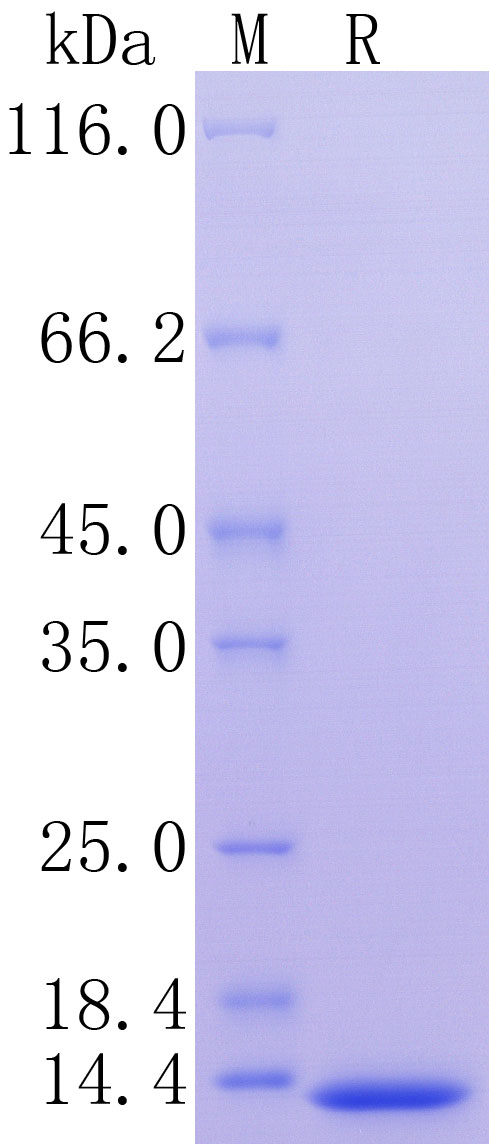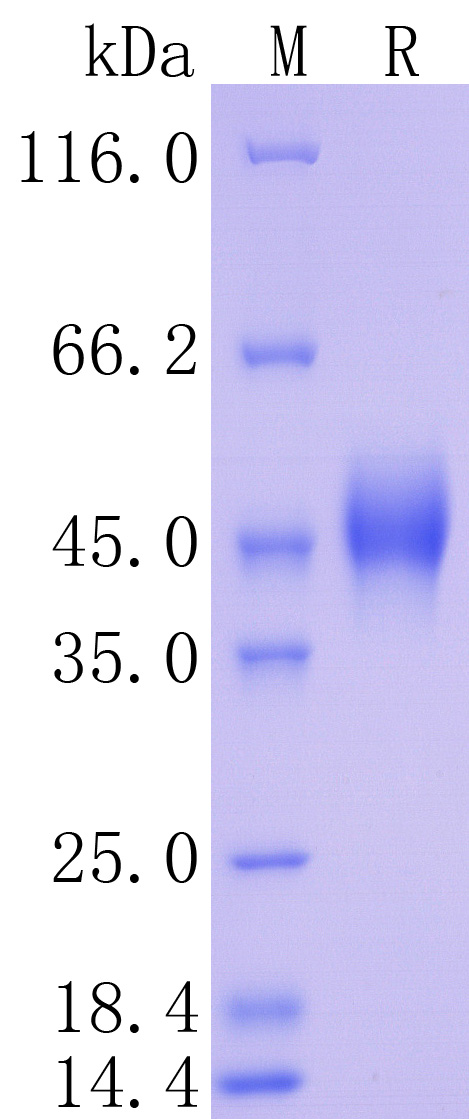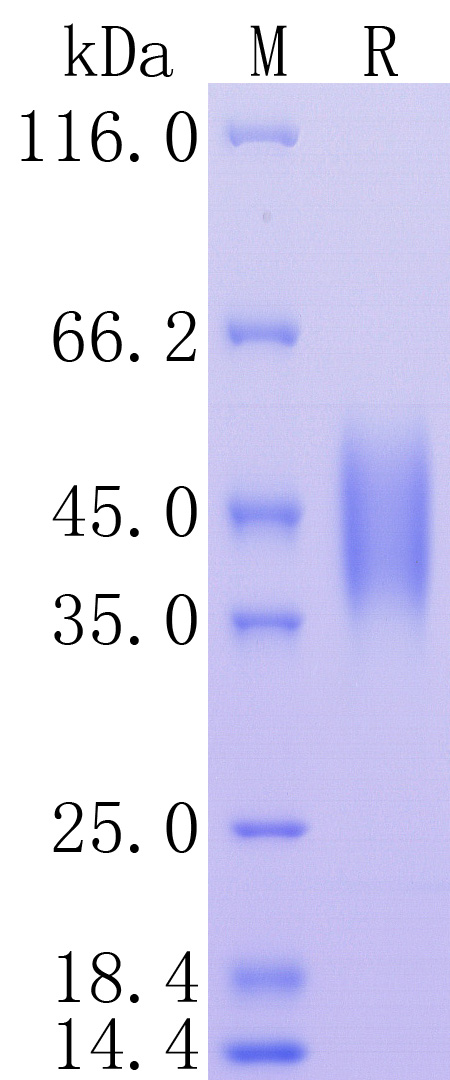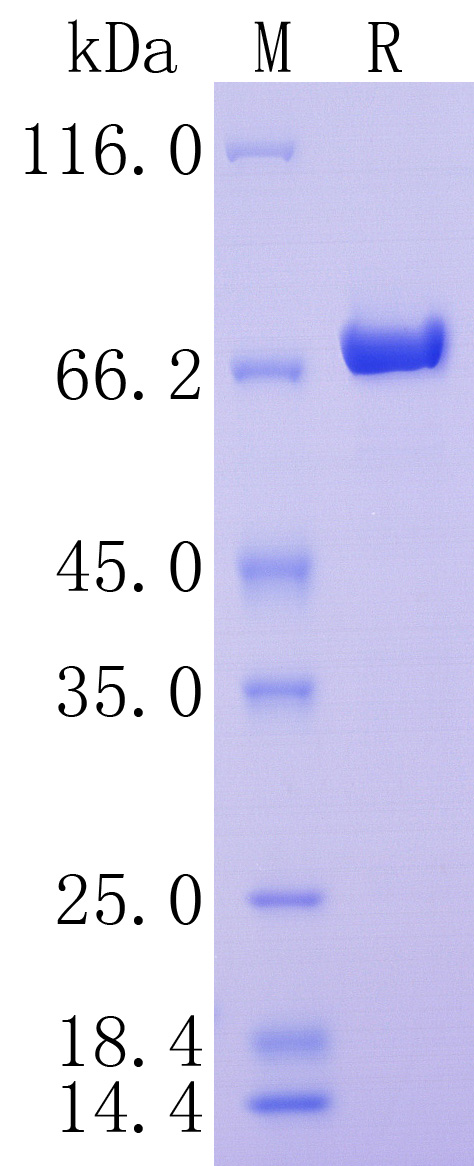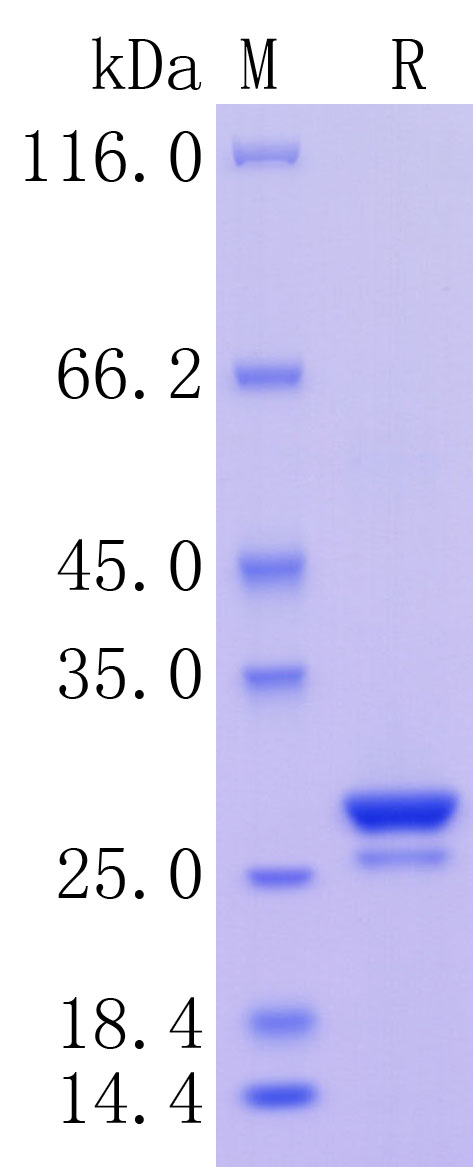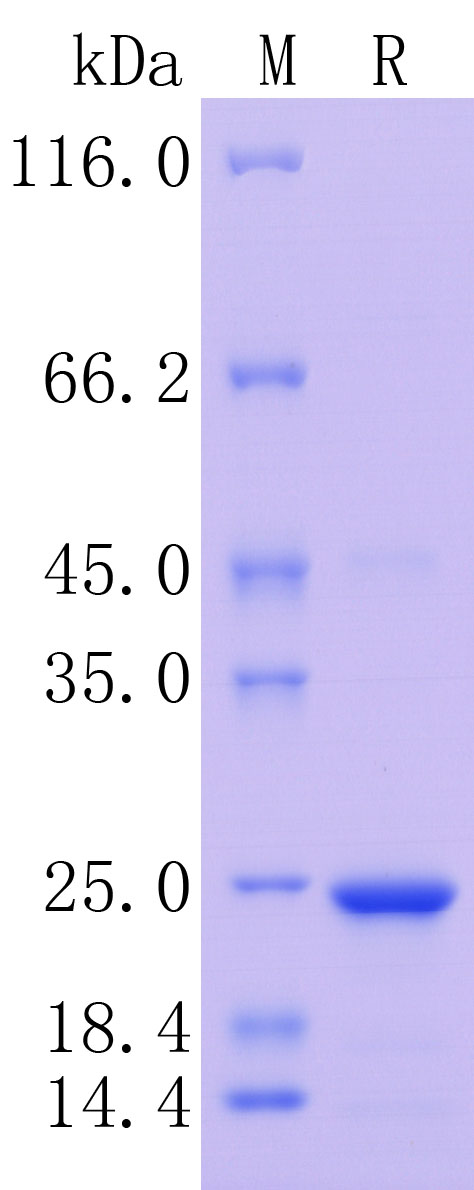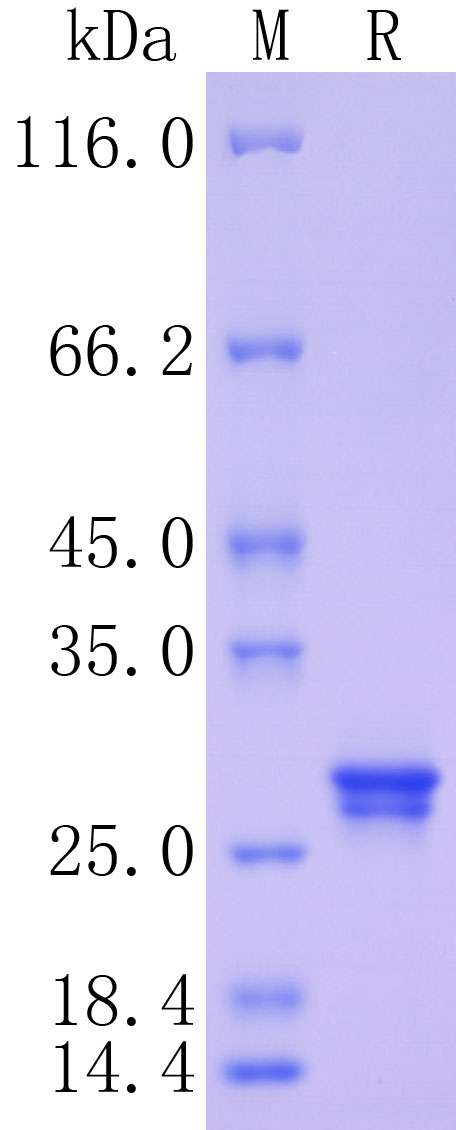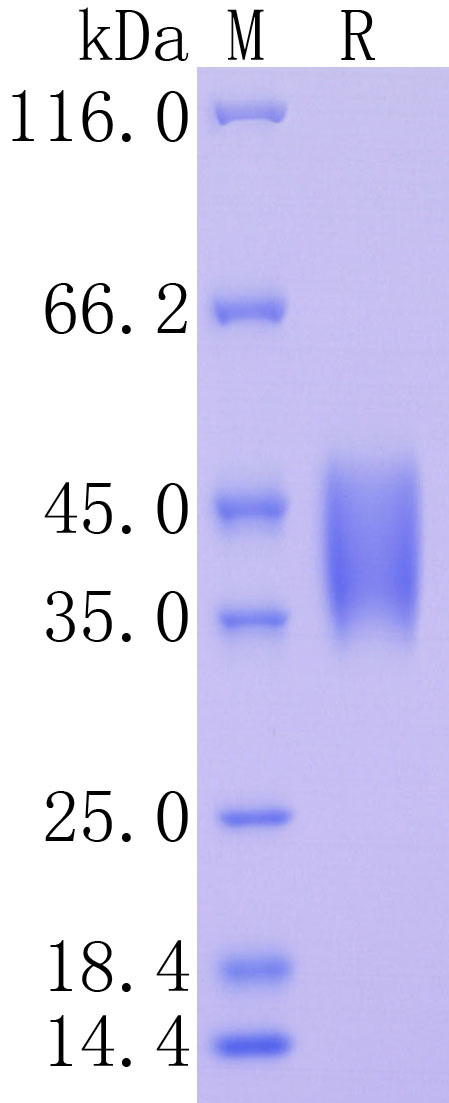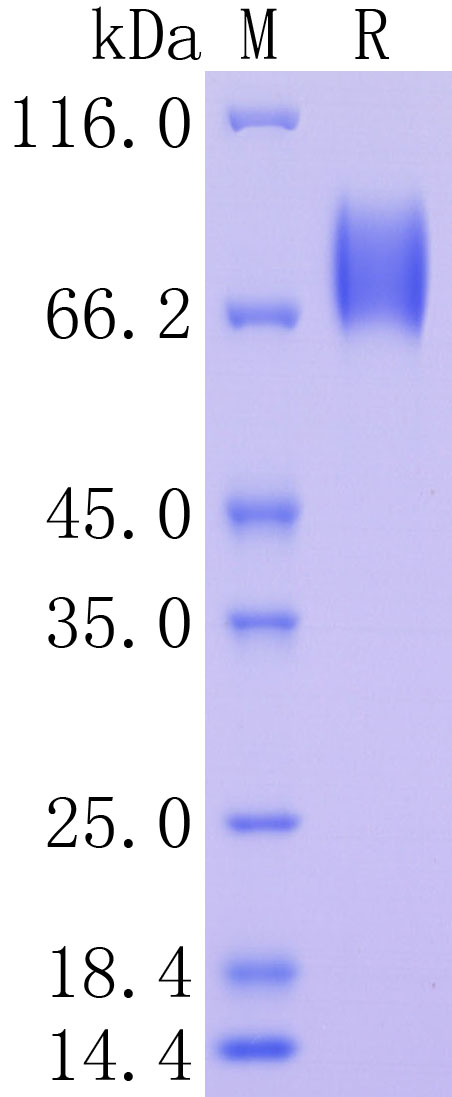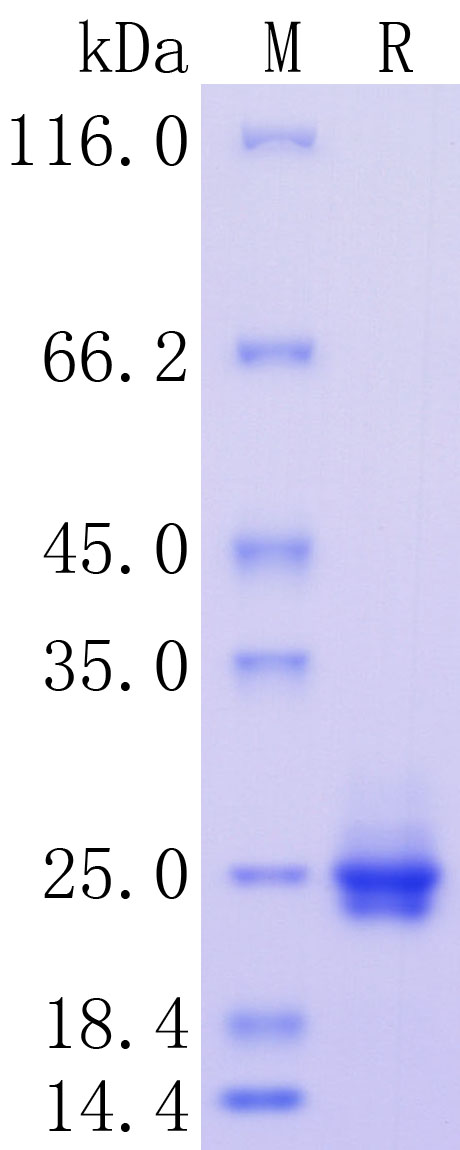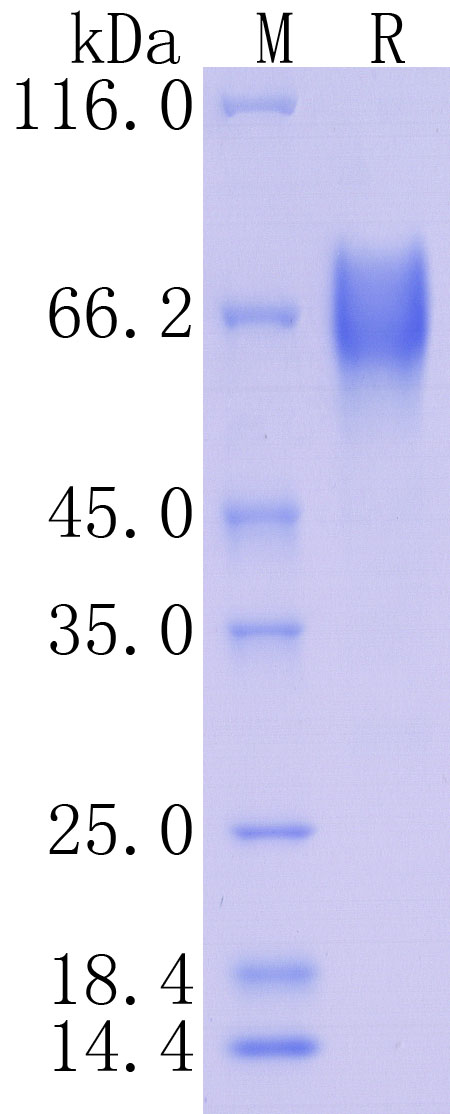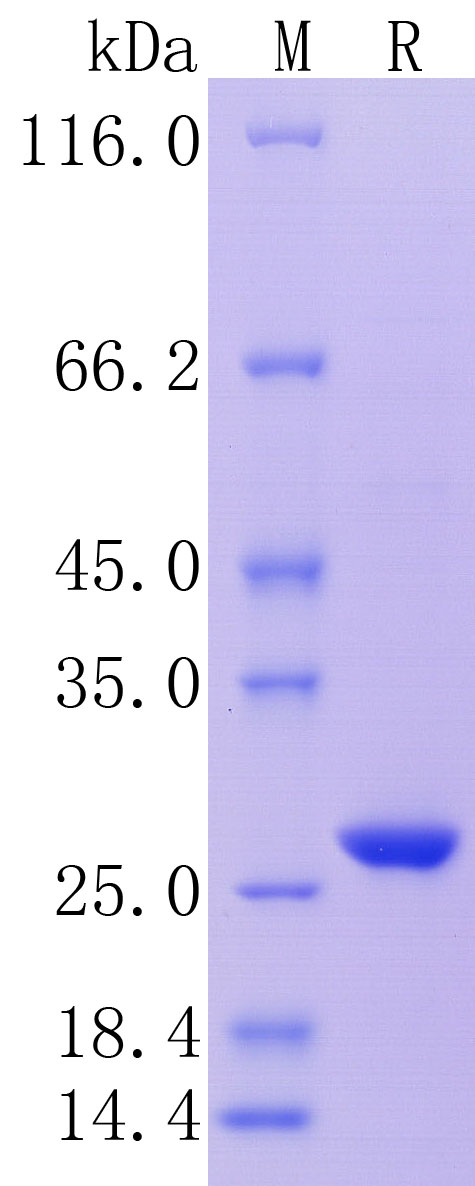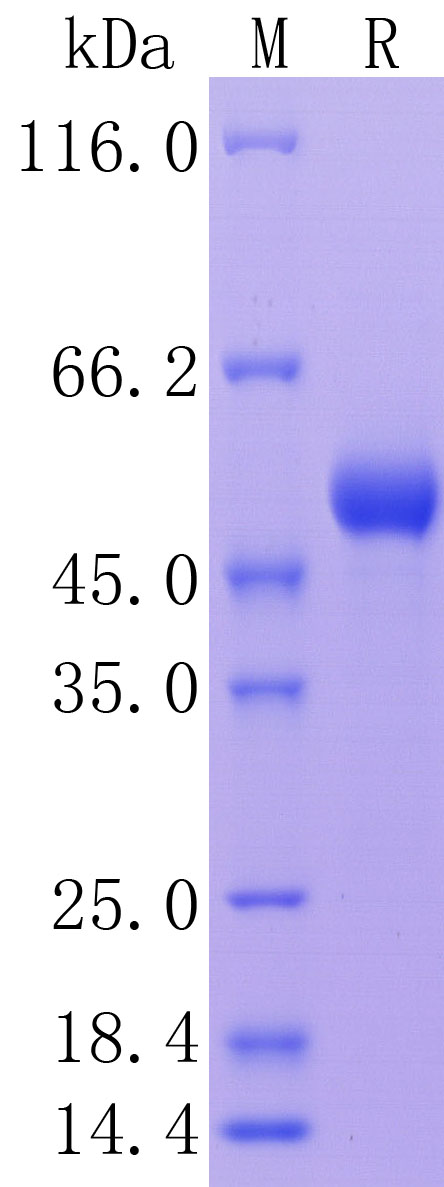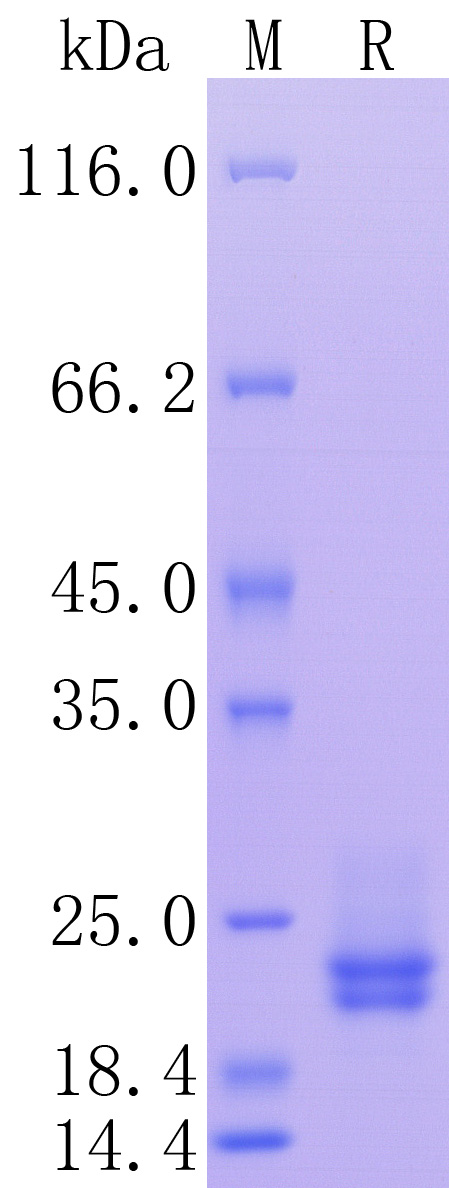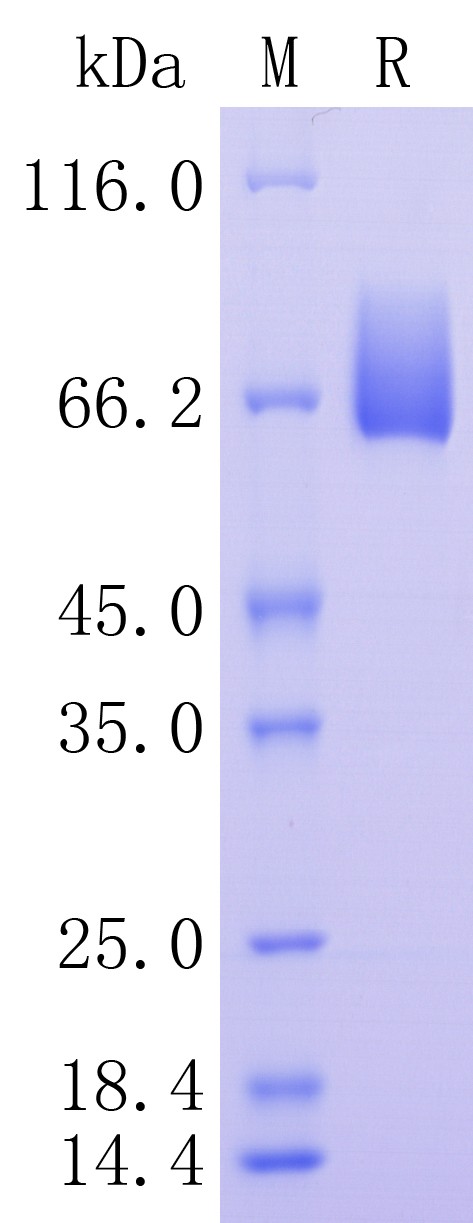Product Information
Product name
Human GFAP, Tag Free Protein
Catalog No.
HA210990
Predicted molecular mass
50.2 kD
Protein construction description
A DNA sequence encoding the human GFAP protein (P14136-1) (Met 1-Met 432) was expressed with tag free.
Accession
P14136-1
Protein construction
Source
E.coli
Bio Activity
Testing in progress.
Purity
>95% as determined by SDS-PAGE.
Endotoxin
Less than 1.0 EU per μg by the LAL method.
Formulation
Lyophilized from a 0.2 μm filtered solution of PBS, pH7.4, 5% Trehalose, 5% mannitol.
Species
Human
Background
This gene encodes one of the major intermediate filament proteins of mature astrocytes. It is used as a marker to distinguish astrocytes from other glial cells during development. Mutations in this gene cause Alexander disease, a rare disorder of astrocytes in the central nervous system. Alternative splicing results in multiple transcript variants encoding distinct isoforms. A rare disorder of the central nervous system. The most common form affects infants and young children, and is characterized by progressive failure of central myelination, usually leading to death within the first decade. Infants with Alexander disease develop a leukodystrophy with macrocephaly, seizures, and psychomotor retardation. Patients with juvenile or adult forms typically experience ataxia, bulbar signs and spasticity, and a more slowly progressive course. Histologically, Alexander disease is characterized by Rosenthal fibers, homogeneous eosinophilic inclusions in astrocytes.
Usage guide
Shipping
In general, recombinant proteins are provided as lyophilized powder which are shipped with blue ice. Bulk packages of recombinant proteins are provided as frozen liquid which are shipped with dry ice.
Storage
Please avoid repeated freeze-thaw cycles. Samples are stable for up to twelve months from date of receipt at -20℃ to -80℃ It is recommended that aliquot the reconstituted solution to minimize freeze-thaw cycles.
Reconstitution
Reconstitute at 250 μg/ml in sterile water.
同靶点&同通路的产品
Human NCAM1/CD56, Tag Free (ECD)
Application:
Reactivity: Human
Conjugate:
Human PMCA1/ATP2B1, C-His Tag
Application:
Reactivity: Human
Conjugate:
Human SPR, C-His Tag
Application:
Reactivity: Human
Conjugate:
Human IFN-gamma R1, C-His Tag (ECD)
Application:
Reactivity: Human
Conjugate:
Human IL2RG/CD132, C-His Tag (ECD)
Application:
Reactivity: Human
Conjugate:
Human DLK1, C-His Tag (ECD)
Application:
Reactivity: Human
Conjugate:
Human Annexin A6/ANXA6, N-Twin Strep, C-His, Flag Tag
Application:
Reactivity: Human
Conjugate:
Human IL-4R, C-His, Tag (ECD)
Application:
Reactivity: Human
Conjugate:
Human NRG1, C-Flag (176-246)
Application:
Reactivity: Human
Conjugate:
Human NRG1, Tag Free
Application:
Reactivity: Human
Conjugate:
Human CNTF, Tag Free
Application:
Reactivity: Human
Conjugate:
Human Tau/Tau441, C-His (isoform 2N4R)
Application:
Reactivity: Human
Conjugate:
Human Apolipoprotein E/APOE4 (C130R), Tag Free
Application:
Reactivity: Human
Conjugate:
Human CASQ1, Tag Free
Application:
Reactivity: Human
Conjugate:
Human IL-2R alpha, Tag Free
Application:
Reactivity: Human
Conjugate:
Human ANXA6, C-His Tag
Application:
Reactivity: Human
Conjugate:
Human IL-2RB/CD122, C-His Tag (ECD)
Application:
Reactivity: Human
Conjugate:
Human Siglec-7/CD328, C-His (ECD)
Application:
Reactivity: Human
Conjugate:
Human Sorcin/SRI, N-Twin Strep, C-His, Flag Tag
Application:
Reactivity: Human
Conjugate:
Human CASQ2, Tag Free
Application:
Reactivity: Human
Conjugate:
Human VSNL1, C-His Tag
Application:
Reactivity: Human
Conjugate:
Human CNTF, N-His Tag, C-His Tag
Application:
Reactivity: Human
Conjugate:
Human IFN-alpha/beta R2, C-His Tag (ECD)
Application:
Reactivity: Human
Conjugate:
Human IFN-alpha/beta R1, C-His (ECD)
Application:
Reactivity: Human
Conjugate:
Human IL-6, C-His Tag
Application:
Reactivity: Human
Conjugate:
Human IL-6R, C-His (ECD)
Application:
Reactivity: Human
Conjugate:
Human C-Reactive Protein/CRP, C-His, Flag Tag
Application:
Reactivity: Human
Conjugate:
Human NR4A2/NURR1, C-His Tag
Application:
Reactivity: Human
Conjugate:
Human IL5RA, C-His Tag (ECD)
Application:
Reactivity: Human
Conjugate:
Human IL-6, Tag Free
Application:
Reactivity: Human
Conjugate:
Human ICAM-1/CD54, C-His Tag (ECD)
Application:
Reactivity: Human
Conjugate:
Human E-Cadherin, C-His Tag (ECD)
Application:
Reactivity: Human
Conjugate:
Human Syndecan-1/CD138, C-His Tag (ECD) Protein
Application:
Reactivity: Human
Conjugate:
Human IL-13 R alpha 2/IL13RA2, Tag Free (ECD) Protein
Application:
Reactivity: Human
Conjugate:
Human IL12RB1, C-His Tag (ECD)
Application:
Reactivity: Human
Conjugate:





